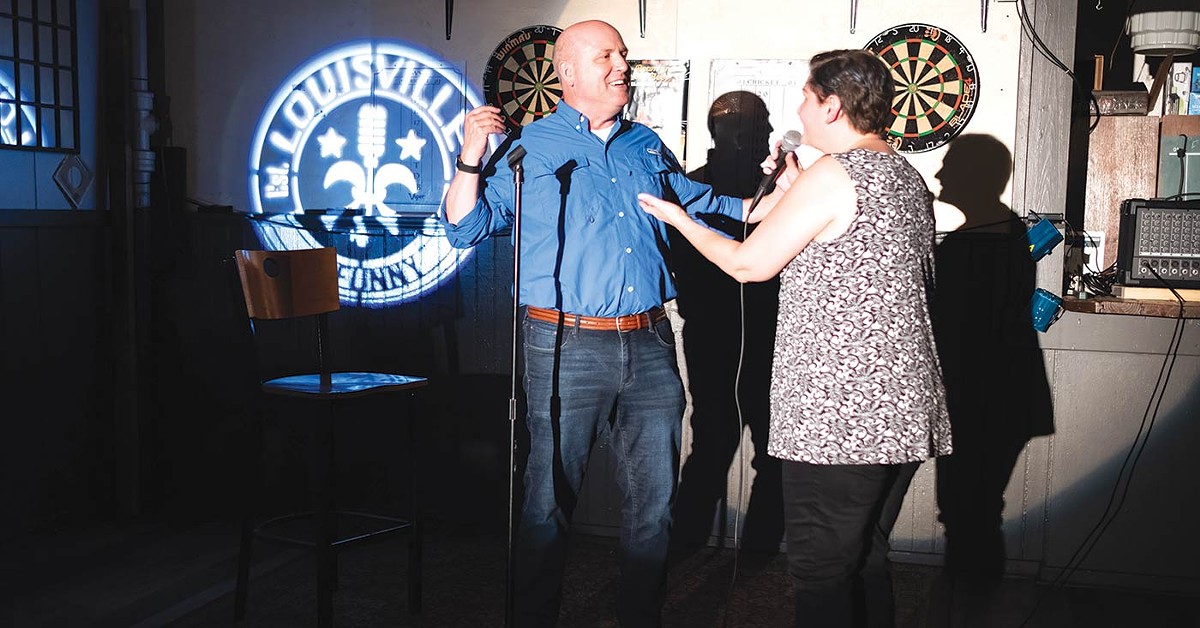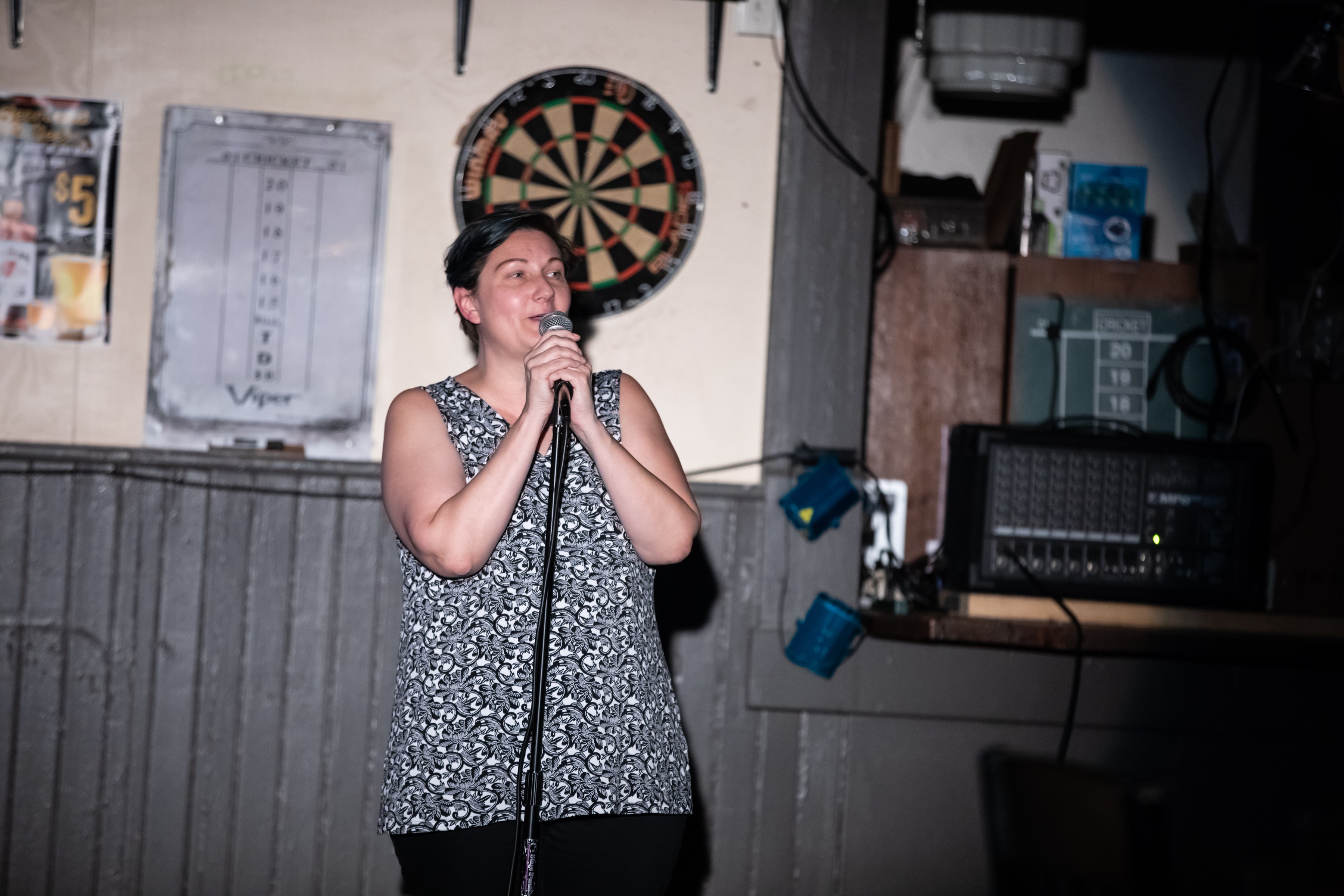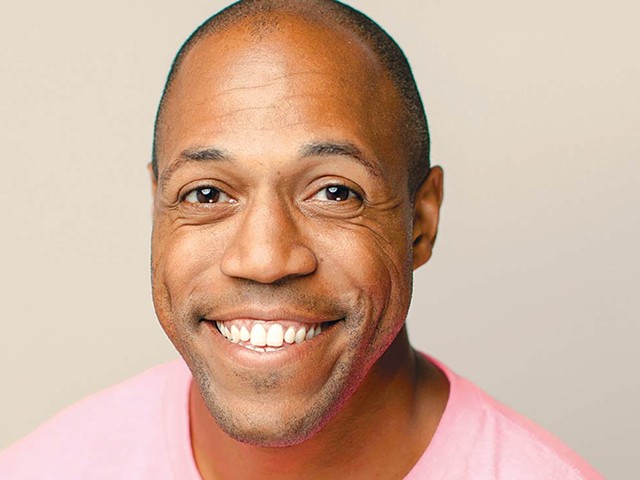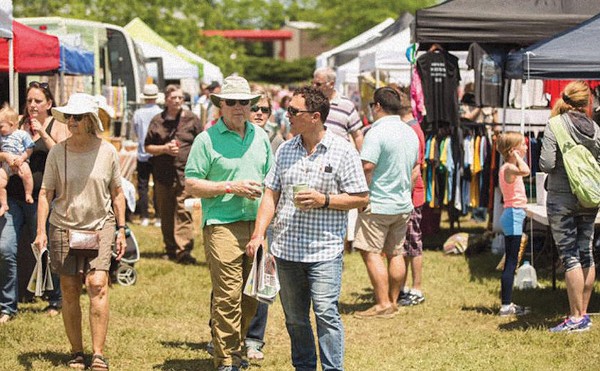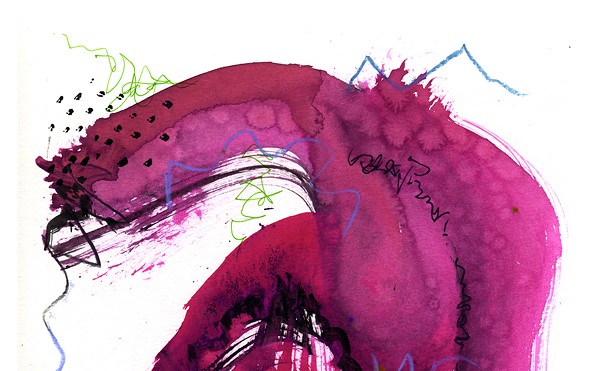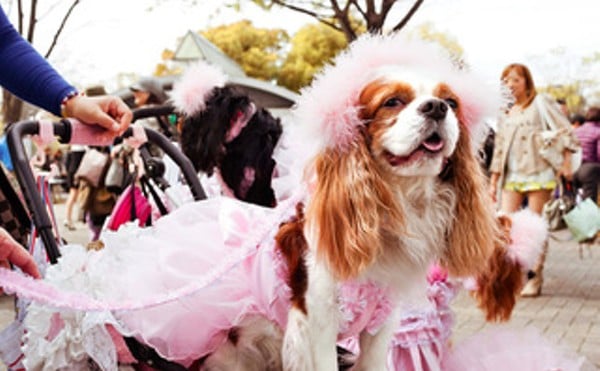Below is Creig Ewing's take on why comedy is hard work. Also, make sure to read Brent Owen's exploration of why Louisville's comedy scene has moved away from clubs into an alt-comedy network of bars, galleries, people's basements and anywhere with a mic.
I could barely breathe. Heart pounding. Hands sweaty. I wasn’t sure if my legs would work.
I wasn’t heading to the emergency room. I was about to go on stage for the first time at The Caravan comedy club during a stand-up comedy open mic a little more than a year ago.
Host Tyler Gooch introduced me, and I stood facing the crowd. Everyone was staring at me expectantly, waiting to see if I would say anything funny. I left the microphone in the mic stand, sure I would drop it with my slippery hands. But I managed to recite the five minutes of material I had.
I got some laughs and, then, my first review.
“I liked the panicked look you did up there,” one comedian said.
The five minutes was over in what seemed like five seconds — time on the stage still goes by in a blur dozens and dozens of open mics, shows and a few laughs later.
I practiced that first set in my head while walking around Louisville. While I was doing that, a guy rushed up to me and said, “I have gonorrhea. Give me $10.”
I was annoyed by the gonorrhea guy at first. Then I thought, “Hey, wait a minute. That’s kind of funny.”
So, one of my first jokes became that I didn’t give $10 to the guy, who may have been the world’s worst panhandler. Why? Because he’d probably just blow the money on penicillin.
Since that set, I have been telling jokes all over the area — in sports bars, lesbian bars, hipster bars, restaurants, houses, churches, hotels, comedy clubs and empty buildings. Comedians will perform anywhere with a stage, a microphone and lights — or at least one of the three.
Stand-up comedy is an art that demands failure. You write and refine a joke, then test it at an open mic to see if you get laughs. You rework it until it’s ready. Making strangers laugh is a science. You want to appear comfortable and in control. The lighting, the time of day, the seating arrangements all play a part.
It doesn’t hurt if the crowd has had a few drinks.
Despite the challenges, Louisville has a vibrant, yet changing, comedy scene. It used to be centered around the club that is now The Caravan, but it has splintered into an alt-comedy scene, in bars, coffee houses, invite-only house shows and just about anywhere you can set up a mic.
Someone has to laugh
The most important — and most appreciated — component to comedy is the audience. The more, the better. Laughter is contagious, and it’s much harder to make four people laugh than it is to make 40 or 400.Comedy is hard.
A comedian who is funny and natural on stage has told thousands of jokes at open mics and showcases, often to silence and blank stares, to learn which jokes work.
It’s soul crushing when the audience doesn’t respond.
Just ask Jen Cooper, who has been performing for about four years.”
“Sometimes you feel like that angry lady sitting in the middle of the crowd who is just not there to laugh is staring right at you,” she said. “Only they’re all that angry lady.”
Other times you have to get up and do your set, even when you don’t feel like it’s your type of audience.
Dan Alten, 28, who has been performing for about 5 ½ years, says he remembers doing a show for about 100 people ages 65 to 85, who were clearly expecting an older comedian.
“When you are going through those motions you feel like everyone is wasting their time,” Alten said. “I should be somewhere else, and they should be somewhere else.”
For all this, the pay — if any — usually stinks. Stage time is the currency for most comics working their way up. Comedians will drive to and from Bloomington or Lexington for the chance to go up for five minutes at an open mic.
Comedy clubs are ideal venues. There are fewer distractions, people are seated as close as possible, and the customers came there to laugh. If you are at a bar with people talking and TVs playing and the customers aren’t expecting stand-up comedy, it can be difficult.
The worst experience was Black Friday after Thanksgiving. I was the host for an open mic at the 19th Green Pub & Grill in Jeffersonville, Indiana. With its cinder block walls and linoleum floor, the 19th Green has the charm of a prison rec room, only with smoking allowed.
I tried to get people’s attention to start the show. Or even to get them to stop talking so others could listen. Or turn around and face the comedians.
No luck.
Comic after comic went up, but everyone seated at the bar turned their backs to the stage and chatted.
It was a win if you could get someone to pause and listen to a punch line on their way to or from the bathroom.
When we mercifully finished, the owner was upset that we didn’t spend another hour being ignored.
Despite experiences like that, greater Louisville has a reputation for having a good comedy scene.
Pete Wolynec, who has been performing for eight years, said a highlight for him was this past New Year’s weekend at The Caravan with all local comedians, including headliner Danny Browning.
“It was packed for every show,” Wolynec said. “It was all local people, and everybody did well. That gave me a lot of positivity as far as comedy in this town. It felt like people were willing to turn out to watch locals, and they were entertained.”
The area has a strong group of comedians, the best of whom make a living touring the country as headliners or feature acts. Others are trying to reach that dream while delivering sandwiches, teaching, working in IT or any job that leaves nights free for stage time.
Some simply make comedy their hobby or therapy.
There is a show or open mic virtually every night in the Louisville area. The Caravan on Bardstown Road is the only comedy club in town, but shows are routinely held up the street at The Bard’s Town, at Kaiju in Germantown and in numerous bars, restaurants, hotels, theaters, houses, country clubs and churches in Louisville and Southern Indiana.
Some comics miss the days when there was more of a mentoring system in place, centered at the comedy club. Veteran comedians would give feedback to newer comedians and recommend those ready to move up.
“When I started there were a lot more people around who would give advice – both positive and negative,” Alten said. “It was much more of an honest environment then.”
The scene became more fragmented, with some comics preferring to perform in the alt scene centered at Kaiju and at house shows or shows in Southern Indiana put on by Vernon Thompson’s Ultra Combo Comedy Live.
Alten has been working full time as a comedian since December. He tours and runs Laff Fest 2014, which regularly puts on house shows and shows at other venues, often for touring comics in town.
He’d like to see more comedians get out of their comfort zones.
“The scene is very segmented, and I think everyone is far too complacent with how they view themselves in that group,” he said. “A lot of people only do one room, but they do fine in that room, so they don’t have any desire for improvement or anything else.”
A good place to check for the shows in town is the Louisville Is Funny Facebook page. (Disclaimer: I usually compile the list.)
There is a tremendous amount of talent in Louisville. I helped to organize the Tim Northern Comedy Festival, which ran May 30 to June 2. More than 80 comics participated. Almost all were from Louisville or have Louisville ties, and that’s not nearly everyone who regularly performs in town.
The comedy scene in Louisville is like a family. A dysfunctional family. We have our fights and Facebook feuds. For the most part, comedians encourage and provide opportunities for each other.
At most of the shows and open mics, the comedians stay to watch, listen and provide an audience for other comics, even if they have heard the comedians dozens of times. If you are lucky, veteran comedian Keith McGill will be there and may pull you aside for feedback.
Touring comic Tim Northern, who is based out of Louisville, gave me feedback one time. He said, “Stay in your lane but swerve.” I don’t know if that has helped my comedy, but it definitely made me a more dangerous driver.
Many comedians in Louisville work hard — often for little or no pay — to run shows that give stage time to local comics. Others open their homes to comics touring the country.
Some of the most talented comics are in the Character Assassination group. Costumed comics roast “celebrities” such as Taylor Swift, Stephen King and “The Avengers.” Louisville performances are usually at The Bard’s Town.
Sketchy Stuff is a sketch comedy group that usually performs at Kaiju. Louisville also has several improv groups.
Louisville has a diverse group of comics, though it includes many more men than women. Comedians Janelle Fitzpatrick and Teresa McCammon have a pair of annual events to encourage and support female comics. The “No Balls Of Meat” comedy contest for women is Aug. 4 and 11 at Play with finals on Aug. 25. “The Virgin and Old Whores Comedy Show, “designed to bring newcomers to the stage, has been held in January for eight years.
How not to be funny
Stand-up comedy has few rules. You get a certain amount of time onstage. Usually the host will shine a light to let the comedian know a minute is left. If you keep going, it’s called blowing the light, and it is a sin.You can joke about anything. Newbies sometimes come on stage and perform strip teases or throw hamburgers. One taboo is being overtly racist. You might get hustled off the stage or not invited back.
Comedians are assumed to be performing their own material. Newcomers might tell “street jokes,” which are common jokes anyone might hear, such as ones about a priest, rabbi and horse walking into a bar. Telling street jokes at a comedy show or open mic is like a pro baseball player wearing cargo shorts to the plate. Of course, open mic comics who tell street jokes often do wear cargo shorts on stage.
Wearing shorts on stage actually is another comedy sin, but one that is often ignored. Especially by comics with better legs than mine.
Even worse than wearing shorts is becoming known as someone who steals jokes. It’s common to come up with a joke or premise on your own and later find that others have already done it. So, you ditch it or change it.
“Joke theft is a very serious crime,” Cooper said. “They’ll let you know if you’ve stolen something from a meme on Facebook. It’s not smart to do. It’s not yours. It’s not organic.”
Dog in diapers
The safest way to avoid that is to make use of material from your experiences. I have a dog named Gidget. He’s a Pomeranian and wears a diaper. That’s five minutes right there.Family is always a great source of material, too. Especially if they aren’t there to hear you joke about them.
Writing jokes is different from other types of writing because until you get the jokes right, or retire them, they are always changing.
You can write what you think is a great three-minute bit about having an English degree. Usually, I will write it from a single idea, such as people think English majors are boring. I start with:
“But that’s not true. Look at me. For fun on Saturday nights I like to stay home watching TV. But with the closed-captioning on so I can point out the grammatical errors.”
Then I build on it with other English major themes:
“It’s not a practical degree, but I am working on the side to earn some cash with scripts for TV pilots. The networks all want rehashes of old shows anyway, like my mystery pilot, ‘Manslaughter She Wrote.’”
When I first write a bit like that, I will flesh it out until I feel good about it. Then, I will go over and over it in my head. Soon, I start feeling less and less sure about it. I’ll probably change the wording dozens of times, maybe add some more punch lines or remove wordy sections before I tell it in front of an audience.
When to quit
An open mic is the place for comedians to try new material and work on their delivery. It’s a good feeling when you try something the first time and the audience laughs. Other times, the audience laughs at only certain parts or just stares at you.That’s when you consider quitting comedy.
If you can craft a bit that works, you can have it in your set for a long time.
That’s one reason most comedians at clubs don’t do a lot of topical humor. If you do jokes about the news of the day, it has a pretty short shelf life. Though I heard jokes about John Wilkes Booth by two different comics the same night, so there are exceptions.
It’s also best to wade carefully into well-trod topics. It’s a cliché but true that many comics joke about their dicks, masturbating or Donald Trump. You can do that as long as you know there are hundreds of dick jokes, Trump jokes and Trump dick jokes already out there.
People also assume comedians are battling with hecklers all of the time.
Hecklers are usually not much of a problem. They can be more of an issue for comics who do a lot of crowd work. That’s when comedians engage the audience, ask questions, maybe tease them a little — or a lot.
In most cases hecklers are just drunk people who think that when a comic asks, “Is anyone here married?” that it’s an opening to go on a rant about an ex.
Another thing comedians often hear is how brave we are to stand up before a crowd and tell jokes. This is fine. We know it can be terrifying, but what we really want to hear is how funny we are. If we cared about how brave we were, we’d be firefighters or something.
The magic for me comes when you are in front of a crowd, getting to your first punch line. All eyes are on you and there is no talk, just silence. Then, the punch line and the laughs.
It makes it all worth it. •

